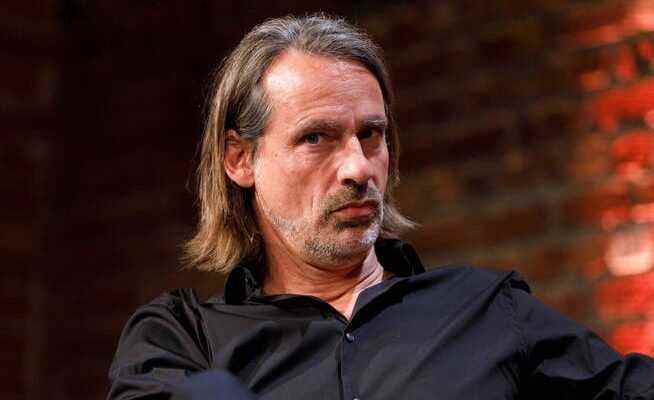The reminder on duty was sitting in front of the camera with Markus Lanz and listed in simple sentences what is currently going wrong.
Richard David Precht also talks about things he regrettably knows little about.
It doesn’t take long to warm up. After ten minutes, the crises of entire regions of the world are explained. CO2-Emissions, rising sea levels, refugees. Richard David Precht is Markus Lanz’s sole guest. He makes a movement with his hands as if he were kneading dough on the pastry board. Precht in the catastrophe tone: “Shifts in the great plate tectonics.” He also says: “The cake does not grow indefinitely.”
When it comes to the state of the world, the metaphors cannot be dramatic enough for the philosopher. The fact that the metaphors often falter may have something to do with the excitement of witnessing processes of decay that no one can recognize as well as he himself: Precht. That’s the name of his own show. He has had a podcast with Markus Lanz for a year, which was broadcast on TV last week.
They know each other well, wear the same brown shirts and like to say “we” in the old tradition of German world explainers. We, that alternately only stands for the two of them or for Europe. Most of the time, however, this We is Germany. We export morality to Africa, but the Chinese export drilling machines. How should we behave in the matter of the Ukraine war? deliver weapons or not?
At this point, the we between Lanz and Precht cracks slightly. The philosopher has signed open letters urging Ukraine to submit to a Russian takeover. For the sake of peace. It remains to be seen whether Putin might not have even more desire for war in Europe after Ukraine.
He talks like the man on the street
Richard David Precht is Germany’s great admonisher. He can put his face in furrows that match the threat level at hand. Facial eclipse zones show that something enlightening is about to happen. In the case of Markus Lanz, Precht says after such a moment: “We live in an age of great overstrain.” It is a typical Precht sentence. In interviews over the past few days, the philosopher assures: “The deforestation, the melting of the Arctic ice, the dwindling biodiversity and the destruction of livelihoods bring with them the greatest changes in human history.” There are no insights that could not be wrested from the famous man off the street.
But Precht, who was born in Solingen, Germany, has worked his way up through journalistic tirelessness into a discourse zone in which it is no longer about what he says, but that he says something. Basically, it’s always the same. From 2013 comes the insight: “What is primarily missing is a vision of how we want to live in the face of enormous challenges in ten or twenty years.” Who speaks like that? Politicians usually speak in zero sentences like these, and they don’t even have to have studied philosophy for it.
If Richard David Precht founded a party, he could count on many voters. His popular-philosophical catastrophism picks up many people where they have had to settle down recently: in fear and uneasiness. For the one-man regulars Precht, the opponent is politics. In a conversation with Markus Lanz, this becomes clear when Precht races across the continents in his historical-philosophical Tour d’Horizon and knows exactly who did something wrong in which century.
Both eyes are turned a blind eye to Putin, because it’s the West and Germany where things are in trouble anyway. “Modern politics is characterized by renunciation of ethos in favor of tactical cleverness and highly flexible principles,” the ubiquitous diagnostician stated nine years ago in “Spiegel”. A finding that one hears from Precht again and again.
The bad media
In addition to the idea of a fundamentally amoral policy, there are a few other convictions that fit at every regulars’ table and that are warmed up depending on the topic. Whether it’s about Corona, the school system or digitization: Politicians make it easy for themselves. It’s not about big things for her, “because big questions in politics always have to remain unanswered and a question counts all the more, the smaller it is and the easier it is to answer it with a little more money”. The conservative publicist Jan Fleischhauer stated years ago that Precht was “contempt for democracy for the better classes”.
Another favorite subject of Richard David Precht is the media. The assumption that politics is about nothing else than appearing in the media with exciting topics is no longer surprising. In addition, Precht has maintained for many years that one should no longer speak one’s opinion against a camarilla of mass media. In truth, there is no better counter-evidence to this thesis than himself. In exactly these years, Precht rose to become a media star worth millions and also said something about things of which he had regrettably little knowledge.
The philosopher never tires of repeating that those who think differently would be “shot” by the German mass media. So far, the sensitive Nostradamus from Solingen has not had one of his long hairs bent. Nevertheless, he wrote a book against the evil mass media. Together with fellow philosopher Harald Welzer. It’s called “The Fourth Estate” and will appear in September.
